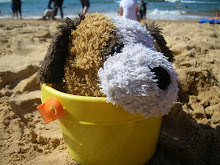This is a loooong novel, often exasperating, occasionally tedious, but ultimately worthwhile.
The main plot is grand Victorian melodrama, featuring the petty criminal turned saintly Jean Valjean and a cast of wicked villains, pure-of-heart women, brave-to-the-point-of-stupidity-and-beyond heroes and impish street urchins. I particularly enjoyed the indefatigable and morally neutral policeman Javert, surely the model for Tommy Lee Jones character in The Fugitive:
"I didn't kill my wife"
"I don't care"
Like War and Peace or Moby Dick, the reader is expected to indulge the author's wild digressions from the narrative thread. The first 70 pages are an eventless description of a pure-hearted bishop who plays his role in the story but dies shortly thereafter. Depictions of Waterloo and the Paris sewers betray the research that went into them all too obviously, and the story is often abandoned for slabs of lengthy historical exegesis.
The book has many faults, but the pay-off is great, particularly in the climactic street battles of the July revolution, when the main characters come together in a miasma of confusion and canon fire.
Good, trashy fun.

